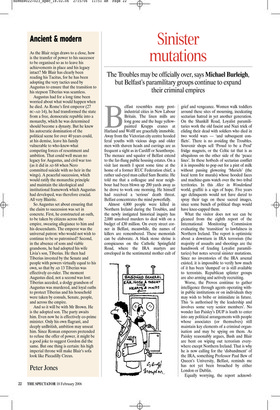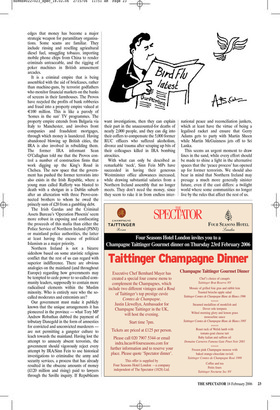Sinister mutations
The Troubles may be officially over, says Michael Burleigh, but Belfast’s paramilitary groups continue to expand their criminal empires Belfast resembles many postindustrial cities in New Labour Britain. The linen mills are long gone and the huge yellowpainted Krupps cranes at Harland and Wolff are gracefully immobile. Away from the Victorian city centre hooded feral youths with vicious dogs and older men with shaven heads and earrings are as frequent a sight as in Cardiff or Scunthorpe. The menace and squalor of Belfast extend to the far-flung public housing estates. On a visit last month I spent some time at the home of a former RUC Federation chief, a rather sad-eyed man called Sam Beattie. He told me that a colleague and near neighbour had been blown up 200 yards away as he drove to work one morning. He himself had received a ‘serious’ death threat. Belfast concentrates the mind powerfully.
Almost 4,000 people were killed in Northern Ireland during the Troubles, and the newly instigated historical inquiry has 2,000 unsolved murders to deal with on a budget of £30 million. On every street corner in Belfast, meanwhile, the names of killers are remembered. These memorials can be elaborate. A black stone shrine is conspicuous on the Catholic Springfield Road, where the IRA martyrs are enveloped in the sentimental mother cult of grief and vengeance. Women walk toddlers around these sites of mourning, inculcating sectarian hatred in yet another generation. On the Shankill Road, Loyalist paramilitaries work the old fascist and Nazi trick of eliding their dead with soldiers who died in two world wars — ‘and subsequent conflicts’. There is no avoiding the Troubles. Souvenir shops sell ‘Proud to be a Prod’ fridge magnets, or the Celtic tat that is as ubiquitous on the other side of the ‘peace lines’. In these hotbeds of sectarian conflict it is impossible to pop out for a pint of milk without passing glowering ‘Muriels’ (the local term for murals) whose hooded faces and machine-guns watch over the two tribal territories. In this Alice in Wonderland world, graffiti is a sign of hope. Five years ago delinquents would not have dared to spray their tags on these sacred images, since some bunch of political thugs would have knee-capped them.
What the visitor does not see can be gleaned from the eighth report of the International Monitoring Commission evaluating the ‘transition’ to lawfulness in Northern Ireland. The report is optimistic about a downturn in IRA terrorism (the majority of assaults and shootings are the handiwork of feuding Loyalist paramilitaries) but notes several sinister mutations. Since no inventories of the IRA arsenal existed, it is impossible to verify how much of it has been ‘dumped’ or is still available to terrorists. Republican splinter groups are also arming and actively recruiting.
Worse, the Provos continue to gather intelligence through agents operating within public institutions or on individuals they may wish to bribe or intimidate in future. This ‘is authorised by the leadership and involves some very senior members’. No wonder Ian Paisley’s DUP is loath to enter into any political arrangements with people whose associates (or themselves) still maintain key elements of a criminal organisation and may be spying on them. As Paisley reasonably argues, Bush and Blair are bent on wiping out terrorism everywhere except Northern Ireland. That is why he is now calling for the ‘disbandment’ of the IRA, something Professor Paul Bew of Queen’s University, Belfast, reminds me has not yet been broached by either London or Dublin.
Equally worrying, the report acknowl edges that money has become a major strategic weapon for paramilitary organisations. Some scams are familiar. They include rinsing and reselling agricultural diesel fuel, smuggling tobacco, importing mobile phone chips from China to render criminals untraceable, and the rigging of poker machines in British amusement arcades.
It is a criminal empire that is being assembled with the aid of briefcases, rather than machine-guns, by terrorist godfathers who monitor financial markets on the banks of screens in their farmhouses. The Provos have recycled the profits of bank robberies and fraud into a property empire valued at €100 million. This is like a parody of ‘homes in the sun’ TV programmes. The property empire extends from Bulgaria via Italy to Manchester, and involves front companies and fraudulent mortgages, through which money is laundered. Having abandoned blowing up British cities, the IRA is also involved in rebuilding them. The former IRA informant Sean O’Callaghan told me that the Provos control a number of construction firms that work digging up the King’s Road in Chelsea. The new space that the government has pushed the former terrorists into also exists in the Irish Republic, where a young man called Rafferty was blasted to death with a shotgun in a Dublin suburb after an altercation with three Provo-connected brothers to whom he owed the princely sum of £20 from a gambling debt.
The Irish Gardas and the Criminal Assets Bureau’s ‘Operation Phoenix’ seem more robust in exposing and confiscating the proceeds of this mafia than either the Police Service of Northern Ireland (PSNI) or mainland police authorities, the latter at least having the excuse of political Islamism as a major priority.
Northern Ireland is not a bizarre sideshow based on some atavistic religious conflict that the rest of us can regard with superior indifference. There are obvious analogies on the mainland (and throughout Europe) regarding how governments may be tempted to cede power to so-called community leaders, supposedly to contain more radicalised elements within the Muslim minority. Who is entirely sure who the socalled moderates and extremists are?
Our government must make it publicly known that the unique arrangements it has pioneered in the province — what Tory MP Andrew Robathan dubbed the payment of tributary Danegeld in the form of amnesties for convicted and unconvicted murderers are not permitting a gangster culture to leach towards the mainland. Having lost the attempt to amnesty absent terrorists, the government should vigorously reject every attempt by IRA/Sinn Fein to use historical investigations to criminalise the army and security services, a process that has already resulted in the obscene amounts of money (£120 million and rising) paid to lawyers through the Saville inquiry. If Republicans want investigations, then they can explain their part in the unaccounted-for deaths of nearly 2,000 people, and they can dig into their coffers to compensate the 5,000 former RUC officers who suffered alcoholism, divorce and trauma after scraping up bits of their colleagues killed in IRA bombing atrocities.
With what can only be described as remarkable ‘neck’, Sinn Fein MPs have succeeded in having their generous Westminster office allowances increased, while drawing substantial salaries from a Northern Ireland assembly that no longer meets. They don’t need the money, since they seem to rake it in from endless inter national peace and reconciliation junkets, which at least have the virtue of being a legalised racket and ensure that Gerry Adams gets to party with Martin Sheen while Martin McGuinness jets off to Sri Lanka.
This seems an urgent moment to draw lines in the sand, while every effort should be made to shine a light in the alternative spaces that the ‘peace process’ has opened up for former terrorists. We should also bear in mind that Northern Ireland may presage a much more generally sinister future, even if the cast differs: a twilight world where some communities no longer live by the rules that affect the rest of us.



















































































 Previous page
Previous page